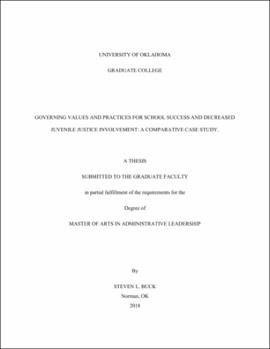| dc.contributor.advisor | Bisel, Ryan | |
| dc.contributor.author | Buck, Steven | |
| dc.date.accessioned | 2018-12-13T21:21:03Z | |
| dc.date.available | 2018-12-13T21:21:03Z | |
| dc.date.issued | 2018-12-14 | |
| dc.identifier.uri | https://hdl.handle.net/11244/316763 | |
| dc.description.abstract | This comparative case study of two elementary schools employs Flexible Leadership
Theory (FLT) and cultural leadership theories in order to explore how leadership approaches
influence student academic success and the prevention of juvenile justice involvement. The
researcher used a comparative case study framework in order to contrast two demographicallysimilar
elementary schools, which varied greatly in terms of students’ juvenile justice
involvement. The researcher interviewed a minimum of six stakeholders per school and used an
interview guide to facilitate participant responses. Results of the study indicate that FLT and
cultural leadership are present in the two schools studied. Most notably, FLT and culture
development regarding the importance of attendance, individual student relationships, and
individual response to at-risk behaviors differentiate the two comparison schools. Results also
suggest leadership and cultural practices that prevent juvenile justice involvement when other
considerations are present. | en_US |
| dc.language | en_US | en_US |
| dc.subject | Leadership and Culture in Primary (Elementary) Schools and Juvenile Justice | en_US |
| dc.title | Governing Values and Practices for School Success and Decreased Juvenile Justice Involvement: A Comparative Case Study | en_US |
| dc.contributor.committeeMember | Alavi, Roksana | |
| dc.contributor.committeeMember | Duncan, John | |
| dc.date.manuscript | 2018-12-05 | |
| dc.thesis.degree | Master of Arts in Administrative Leadership | en_US |
| ou.group | College of Professional and Continuing Studies | en_US |
| shareok.nativefileaccess | restricted | en_US |
